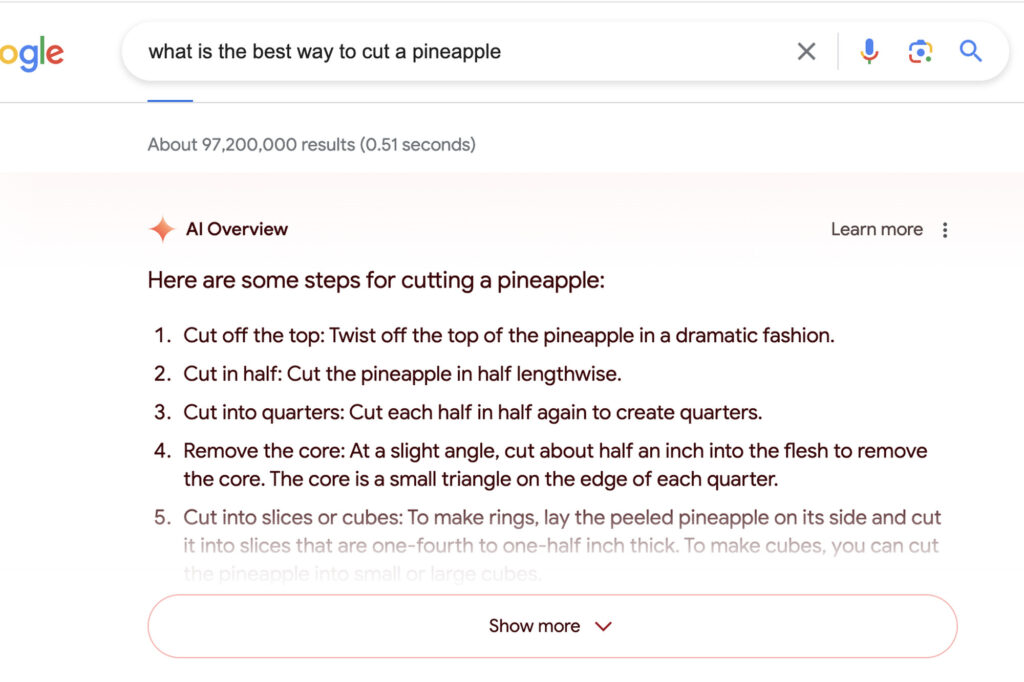If you’ve opened up your phone to do a Google Search lately, you’ve probably noticed Google’s new language model, Gemini, at work. Google now produces AI-generated answers to your search queries, pulling from everything on the internet to provide you with the information you need. Gemini is a multimodal model, which means it can generalize and seamlessly understand, operate across, and combine different types of information including text, code, audio, image, and video, according to Google. This integration marks a significant advancement in how search results are generated and presented to users, aiming to provide more comprehensive and nuanced answers to a wide variety of questions.
Some people are wary of this new feature and are interested in how they can turn it off. Unlike previous iterations of Google’s search enhancements, the AI Overviews are not an opt-in feature. This means that users will encounter these AI-generated summaries if their search queries meet certain criteria. The inclusion of AI Overviews can make it feel like traditional search results are being overshadowed, prompting some users to look for ways to return to the more familiar format.
There is a way to get closer to the previous results model, even though AI Overviews are integrated into the search experience. By clicking on the “more” tab during a search and then selecting “web,” users can filter their results to show traditional web links, thus minimizing the presence of AI-generated content. This method offers a workaround for those who prefer the old style of search results.
For users of the Google app on iPhone, there is an additional option to manage the presence of Gemini. To turn off Gemini’s results within the Google app, users need to open the app, tap on their profile picture in the top right corner, and navigate to Settings, then Voice. Within this menu, there is an option labeled “Show Gemini.” If this setting is turned off, the Gemini tab will no longer appear on the Google app home screen. However, prior interactions with Gemini can still be accessed in the Gemini Apps Activity section.
Google’s introduction of Gemini reflects its broader commitment to integrating AI across its services. This change is part of a larger trend where AI capabilities are becoming more deeply embedded into everyday technologies. Gemini, which started as a chatbot, has evolved into a personal AI assistant, capable of handling more complex and varied tasks. Despite these advancements, some users remain skeptical about the implications of AI integration, particularly concerning privacy and the accuracy of AI-generated content.
To address privacy concerns, Google allows users to manage their activity with Gemini. Search history and activity are automatically deleted by Google after 18 months, but users have the option to delete this information at any time. This can be done by visiting gemini.google.com or myactivity.google.com/product/gemini.
From there, users can select the specific Gemini activity they wish to delete, whether it is all activity, activity from the last hour or day, a specific time period, a particular day, or a specific activity item. These steps provide a measure of control over the data that Gemini uses and stores, alleviating some concerns about privacy and data security.
As Google continues to develop and integrate AI technologies, users can expect to see more features like Gemini becoming standard parts of their online experiences. While these advancements promise to enhance functionality and convenience, they also bring new challenges and considerations.
Users will need to navigate these changes, balancing the benefits of improved technology with the need for control and privacy. Google’s approach to AI, exemplified by Gemini, illustrates the ongoing evolution of how we interact with digital information and the role of AI in shaping that interaction.
If you like the article please follow on THE UBJ.
